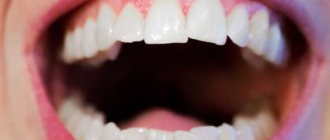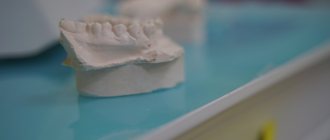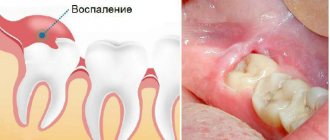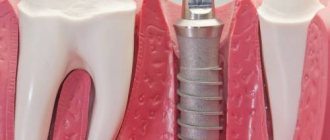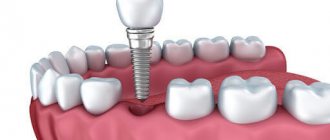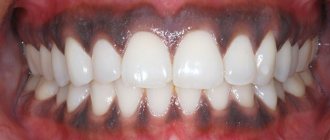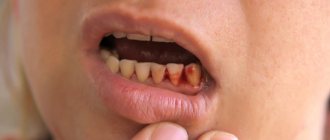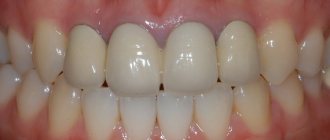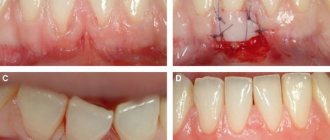The science of dentistry, fortunately for many, many of us, is developing by leaps and bounds. In the 21st century, if a person is missing 1-2 teeth, he does not have to get a bridge and spoil the adjacent rows; he can simply have an implant installed. We all know about the benefits of this type of prosthetics, but we rarely pay attention to the dangers of such work and care after removal of the prosthesis. Let's discuss possible gum inflammation after implant placement and ways to avoid it.
Before deciding to undergo dental implantation, you should understand that this is a rather complex and traumatic procedure. You should be prepared for the natural consequences of such an intervention - pain, swelling, bleeding.
When a foreign body is implanted, unpleasant sensations in the gums and jawbone are inevitable. However, if the operation was successful and the body accepts the new “roots” well, all unpleasant symptoms disappear after a few days. But if the days go by and the condition does not improve, it is worth considering additional gum support.
The first 2-3 days after dental implantation
You have just come home from implant surgery. We are confident that you feel well, but feel a slight general weakness caused by the operation and general psychological stress, as well as numbness caused by the anesthesia and excess pressure on the nerves. It will go away on its own in 5-6 hours (the maximum will persist locally and locally for a week).
“In the first days after surgery, we recommend staying within reach of the dentist - no need to go out of town or on a business trip, so that if your condition worsens, you can receive timely medical help.”
Bespalov Roman Dmitrievich, maxillofacial surgeon, implantologist, work experience of more than 26 years make an appointment
Implantation WITHOUT complications! Smart technologies allow us to effectively restore teeth and your health. Consultation and diagnostics FREE
Tell us about your problem
Nutrition rules
The main requirement is a minimum load on the implants both on the first day and in the next 2-3 days. The following nutritional rules must be followed:
General rules for what you can eat and drink
- refuse food during the first three hours,
- after 3 hours you can eat: give preference to soft and warm foods (warm soups, yoghurts are ideal),
- over the next three days, hot and cold food, drinks,
- eliminate spicy and sour foods from your diet,
- It is necessary to chew food on the side of the dentition where there are no sutures,
- your diet should be varied - make sure the foods you eat contain all the essential nutrients, especially calcium,
- you cannot drink alcoholic beverages or smoke,
- It is not advisable to drink coffee and black tea; it is better to give preference to herbal tea or dried fruit/fruit compote,
- Do not consume solid foods, excessively cold or hot drinks,
- It is important to drink as much water as possible (up to 1.5-2 liters).
Don’t give up meals – gradually introduce all foods into your diet. Remember that your body needs strength and energy to recover. The diet should be of high quality and as healthy as possible.
Sample menu - what should be the diet in the first 2-3 days after surgery
- soft cottage cheese, various yoghurts, you can buy baby food in jars - give preference to meat products and vegetables. In the first 2 days, if you do not receive dentures immediately, your diet will consist exclusively of liquid and puree foods,
- make yourself some broth. This can also be a regular soup, but it is better to use a blender before using it. On the first day, you can afford mashed boiled vegetables. All food should be warm - neither hot nor cold,
- For drinking, water is a priority, but you can indulge in warm herbal tea, especially one that acts on the nervous system as a sedative. Be sure to buy a straw - if you need stitches, you're better off eating this way.
Can I drink alcohol after getting implants?
To the question “is it possible to drink alcoholic beverages after implantation,” our answer is categorical. NO. See our reasons why we strongly do not recommend drinking alcohol after having implants:
- bone tissue is destroyed, gums heal poorly,
- fusel oil, which is contained in alcohol, slows down the healing process and causes inflammation of the gums, increases the risk of complications - hematoma, purulent inflammation, peri-implantitis and implant rejection,
- antibiotics are prescribed, which means alcohol is prohibited - the combination can be life-threatening,
- inappropriate actions and inability to perform hygiene, because when a person is heavily intoxicated, he cannot control his actions,
- your appetite increases – you can damage your implants,
- your immune system stops working fully,
- you forget that you need to visit a doctor: such situations arise in situations where the patient drinks alcoholic beverages for a long period of time. Shifting the visit to the doctor by 1-2 days (after a month after installation of the implants) is allowed. But in the first week, visits to the doctor should be strictly day-to-day,
- you may lose your warranty.
Please do not read the Internet and do not study the stories of people who wrote that “they drank alcohol after getting implants or a tooth removed and nothing happened.” A lot depends on the amount of alcohol consumed, the nature of the surgery, its complexity, your state of health and the medications prescribed. If it worked for others, this does not mean that you will not have complications either.
Read more about the negative effects of alcohol on the body in our separate article.
Drinking alcohol should not become an obstacle to living a full life and maintaining the results of expensive treatment!
What happens to gum tissue during the implantation process?
There are different types of implants: subosseous implants are inserted into the jaw bone, periosteal implants are inserted into the soft tissues of the jaw. Sometimes the socket of an extracted tooth is used for implantation, but in some cases it is necessary to artificially deepen the socket or completely dissect the gum from the outside - this is done either with a scalpel or a laser.
After the incision, surgical sutures are made on the gums to hold the tissue until it heals completely.
In some cases, after installation of the implant, gum grafting is performed separately - then healing takes several weeks longer.
Hygiene rules
- do not touch the area of sutures and installed implants with your hands or tongue,
- in the first 3-4 days, limit yourself to oral baths (just hold the solution/water in the mouth), after which you can carefully rinse,
- on days 3-5, that is, after the inflammation and swelling have reduced, you need to start using a toothbrush. The recommended bristle hardness is soft or ultra soft, so as not to damage the gum tissue and the area of sutures,
- introduce toothpaste at the same time as starting to use the brush: Parodontax, ROCS or RasYan Herbal Clove toothpaste (for example, herbal, clove). These pastes allow effective prevention of gum inflammation,
- starting from 2-3 weeks after installing the implants, after each meal, use an irrigator (to begin with, at 1-2 speed, that is, minimum), and finally rinse your mouth with water or an antibacterial rinse.
After implant treatment, be sure to buy a new toothbrush. Do not use the old one - it contains a huge number of microbes and bacteria that can lead to the development of an inflammatory process.
Average cost of drugs to treat complications
The average cost of pharmacological drugs used during the recovery period after implantation is:
| Name of service | Cost, rub. |
| Ascorbic acid | 24 |
| Analgin | 50 |
| Ketanov | 60 |
| Linex | 220 |
| Voltaren | 230 |
| Amoxiclav | 310 |
| Flemoklav | 350 |
| Erius | 560 |
| Calcium D3 Nycomed | 570 |
| Nimesil | 700 |
Cost of medicines for antiseptic treatment of the oral cavity, as well as healing ointments:
| Name of service | Cost, rub. |
| Chlorhexidine | 15-20 |
| Tantum Verde solution | 280 |
| Betadine 10% solution (120 ml) | 280 |
| Solcoseryl | 370 |
The most accessible are folk remedies , the cost of which is:
| Name of service | Cost, rub. |
| Chamomile herb | 60 |
| Plantain leaves | 70 |
| Calendula flowers | 110 |
| Fish fat | 140 |
| Propolis | 300 |
Drug treatment
Don't forget about cold compresses to reduce the likelihood of swelling - apply ice, a piece of meat or frozen vegetables, a container or ice pack wrapped in 2-3 layers of thin cloth to your cheek. The duration of the compress is 5-10 minutes, breaks are 3-5 minutes. The number of approaches is 7-10 times, for approximately 1.5-2 hours. Compresses should be started immediately upon returning home after surgery, and can also be repeated periodically during the first 24 hours.
Your doctor has prescribed painkillers for you. Monitor your condition - if necessary, you can take a pill at night or after you have stopped feeling the effect of anesthesia, that is, pain has appeared.
The list of prescriptions for each patient is individual and is indicated in the recommendations issued by the doctor. But in any case, you will be prescribed ointments to apply to the area of sutures, antibiotics (taken for at least 7 days, as prescribed by a doctor), antihistamines to reduce tissue swelling, drugs with a high content of vitamins C and P in the body (to improve the condition of the gums ), antiseptic agents for oral baths (do not rinse for the first 3 days - just keep the solution in the mouth).
How and with what to stop
The patient must be prepared for possible complications and know how to behave in a particular situation. The main thing is not to panic, but to direct all your strength to stop the bleeding.
Among the effective means:
- applying cold to the cheek from the side of the operated area for 15-20 minutes;
- lightly pressing the wound with a sterile gauze pad or a piece of bandage for 20 minutes;
- oral baths with cold water - hold for 5 minutes, repeat if there is no effect;
- The attached disposable bag of black tea soaked in water has a hemostatic effect.
- applying medications recommended by a doctor to the wound.
When it is not possible to stop the bleeding within one day, you need to consult an implantologist; a serious pathological process may be occurring.
Lifestyle after surgery: general recommendations
- avoid physical activity, do not lift weights - you must stop doing sports in the next month after implantation,
- avoid hypothermia and overheating - it is recommended to avoid visiting baths, saunas, swimming pools, swimming in the sea/lake also for 1 month,
- stop smoking (if possible) and drinking alcoholic beverages,
- in the first 3-5 days you should avoid air travel,
- If an implantation of the upper jaw has been performed, including a sinus lift procedure (displacement of the maxillary sinus), you must cough, sneeze and blow your nose very carefully - without opening your mouth or puffing out your cheeks (after bone augmentation, any pressure changes and overloads are prohibited).
If you have dental implants, it is prohibited
- use electric toothbrushes, since vibrations and excessive pressure during the cleaning process, especially in the first months after implantation, can lead to poor fixation of implants,
- You should also not use dental floss, especially if only a few implants were installed to replace living teeth. After implantation, the gums become less sensitive and when flossing you may not feel when it is time to stop - this can damage the tissue, which will lead to bacteria getting into the area around the installed implants. And this is already fraught with their possible rejection,
- carry out hygienic cleaning in any dentistry - it is very important that the hygienist knows how and understands how to carry out the procedure in the presence of dental implants,
- Eating foods that are too hard: The denture can be damaged if you bite off hard objects with your teeth, chew pencils, or crack open nuts. Of course, it can be restored, but it is better to prevent such situations from developing.
You will forget about dental problems for the rest of your life! Together with you, we will select the most optimal implantation method and give it a LIFETIME guarantee.
Free consultation
Causes of prolonged bleeding
If the patient does not follow precautions, the sutures that have just been placed may come apart. This can happen even if you don't brush your teeth carefully with a regular brush or floss. Also, accidental damage to a blood vessel during doctor's manipulations can lead to intense bleeding. In this case, a hematoma and severe swelling may occur.
If the patient suffers from hypertension and other cardiovascular diseases, the risk of complications will also be higher. Even simple fear and, as a result, increased blood pressure before surgery can negatively affect its outcome.
To avoid this, it is recommended to undergo a comprehensive examination of the body before implantation. Identification of hereditary abnormalities and a thorough study of the patient’s medical history is the most important task of the dentist and implantologist. It is imperative to undergo a series of blood tests that will help detect contraindications to the procedure and allow you to prepare in advance for possible complications.
When to see a doctor
Contact your healthcare provider if you experience the following symptoms:
- pain that does not decrease/increase on the 3rd day after surgery,
- numbness persists for 2 days after surgery, does not go away a week after implantation and only intensifies, spreading over the entire face,
- a sharp increase in facial swelling on the 2-3rd day or after it has already subsided,
- a sharp increase in body temperature or it does not subside 3-4 days after surgery,
- when pressing on the implants, unpleasant sensations, sharp pain occur,
- the seams came apart
- redness of the gums and bleeding that does not stop after 2-3 hours,
- discomfort and sharp pain when pressing on the area of installed implants 7 days after installation,
- pain after fixing the prosthesis, teeth do not close together, it is impossible to chew even soft food,
- The prosthesis became mobile and some of the teeth chipped.
What medications can a dentist prescribe for recovery?
Recovery of the body after implantation can quite successfully proceed on its own - if, for example, an implant was placed instead of just 1 tooth or two, if the patient is in normal health and follows all the doctor’s recommendations. But often, dentists in the postoperative period prescribe medications to the patient to accelerate tissue regeneration and implant healing. The full list usually includes several different drugs, such as:
- painkillers: for example, the non-steroidal anti-inflammatory drug Ketorol or the analgesic Paracetamol with a minimum number of contraindications. For severe pain, you can take 1 tablet (maximum amount - up to 3-4 tablets per day),
- antibacterial agents: usually these are drugs with complex effects that neutralize various strains of pathogenic bacteria and some protozoan parasites. For example, “Cifran ST”. The dosage and number of tablets per day are prescribed by the dentist, based on the individual characteristics of the patient. The course of treatment lasts on average 7 days,
- decongestants (antihistamines): allergy medications are known to relieve swelling well. Therefore, dentists prescribe, for example, Suprastin or Loratadine. The first is taken 3 times a day, and the second - once at night. The course of admission is 5-7 days,
- vitamin and mineral complexes: they strengthen gums and bones, accelerating the recovery and survival of implants. Useful vitamins for gums are C and PP, and for bones - macroelements calcium and phosphorus.
Frequently asked questions and answers
Don't worry: it's completely normal to feel some discomfort. But be sure to pay attention to the signals your body sends. If in doubt, contact support to find out if your symptoms are normal. Be attentive to your teeth and your body as a whole - remember that implants, the entire jaw system, and you yourself need some time for rehabilitation.
Postoperative consequences and complications
This section discusses the most popular questions about conditions that arise during or in the first days after the installation of implants. Please note that it is very important to distinguish between the concepts of “consequences” (this is the norm, since tissue injury occurs during surgery) and “complications” (they are a pathological condition that requires immediate consultation with a doctor).
During the operation, I heard the doctors and felt that they were doing something in my mouth, although without pain, but I should have been sleeping, why?
You need to understand the difference between concepts such as “sedation” and “general anesthesia.”
General anesthesia is a complete shutdown of consciousness and the patient's immersion in sleep. As a rule, it is carried out by inhalation. Breathing is provided by an artificial lung ventilation device (ALV). Therefore, when using general anesthesia, the patient does not hear or feel anything. Sedation can be xenon (superficial, essentially to calm and saturate the body’s cells with oxygen), as well as intravenous. In the second case, certain anesthetics are introduced into the body (selected individually), their dosage is calculated based on the patient’s weight, his state of health, and the duration of the procedure. If necessary, the drug can be reintroduced during surgery. At the same time, local anesthesia is used.
The Smile-at-Once Clinic has an agreement with a specialized and licensed service of professional anesthesiologists. The ambulance and the team of doctors are certified within the framework of the standards and are an ambulance substation. Therefore, treatment under general anesthesia and intravenous sedation is carried out under the strict supervision of specialized specialists.
The difference between sedation and general anesthesia is that the patient retains the ability to breathe on his own, there are no involuntary reflexes of the respiratory tract (coughing, swallowing), unlike anesthesia, the patient is conscious and can, if necessary, follow the doctor’s instructions.
Since sedation uses more gentle drugs (unlike general anesthesia), the patient does not fall asleep, but relaxes. The action is individual: someone falls asleep for several hours, someone plunges into a state of complete relaxation. If you belong to the second type, then you will really feel everything that happens in the oral cavity. But all procedures are painless, since high-quality local anesthesia is used. And the sensations remain at the level of “moving instruments” in the oral cavity.
I just returned home from implantation and my cheek started to swell. Is this normal and what can I do?
This is a normal process caused by tissue trauma during implant installation. The swelling reaches its peak on the 3rd day, after which it should gradually subside. If the situation is opposite, be sure to consult a doctor. To reduce swelling, you need to apply a cold compress for the first two hours, repeating the course throughout the day if necessary.
The wound bleeds even several hours after the operation. This is fine?
If the bleeding is minor, there is nothing to worry about. You can stop it by applying a piece of sterile gauze to the wound and closing your jaws tightly. Remember not to rinse your mouth, actively move your jaw, chew, suck or swallow forcefully - all of this can increase bleeding.
If 3-5 hours after surgery the bleeding not only does not decrease, but also intensifies, you need to consult a doctor.
Yesterday I had an operation, and today I woke up with blood on my pillow, and the bleeding appears periodically throughout the day, what should I do?
Occasional bleeding is normal up to 7 days after surgery, but usually goes away within 2-3 days. We strongly recommend sleeping in a horizontal position right away, with pillows on the sides of your head. If necessary, make a comfortable tilt angle of up to 30 degrees for yourself.
It is important to sleep strictly on your back, but if you accidentally turned your face to the side in your sleep and were in this position for a long time, then due to tissue compression, bleeding is possible, and depending on the load, even profuse bleeding. The main thing is that it stops within 1-2 hours after you take a vertical position. If the bleeding is persistent, be sure to contact Patient Services to arrange an unscheduled examination by your physician.
I feel uncomfortable in the lying position, I feel pressure in the jaw area and pulsation in my head. What to do?
Such sensations arise due to increased blood flow to the head. In this situation, try sleeping in a semi-sitting position (tilt up to 30 degrees) - use an additional pillow or place it under the mattress, increasing the inclination of the bed. This way the head will be at a higher level in relation to the body and the unpleasant sensations will subside. But it is advisable to fix your head so as not to throw it to the side.
I had bruises on my face – hematomas. Is this normal and how can I remove them?
Hematomas are a consequence of vascular injury during implant installation. They appear quite often after the installation of two-piece structures, as well as after zygomatic implants - they appear approximately 2-3 days after the operation. You have absolutely nothing to worry about - the color of the bruises will change as the tissue begins to recover. In the fight against swelling and bruises, various gels for resolving bruises, for example Badyaga Forte, will help you.
My lips are dry and have small cracks - what does this mean?
This is also a completely normal condition caused by a long stay in the dentist's chair and the lack of natural wetting of the mucous membranes. For the first two to three days, use petroleum jelly or a cream containing lanolin to relieve dry lips. A regular balm may not be enough - you need a cream that is as rich and moisturizing as possible. Also make sure you drink enough fluids.
I have increased salivation after having implants - is this normal?
Saliva is a very important biological medium for the organs and tissues of the oral cavity. It contains many enzymes that promote normal digestion and the formation of healthy oral microflora. The therapeutic norm is the production of liquid by saliva in the amount of 2 ml per ten minutes. In the case of implantation, especially during the period when the denture has not yet been installed, the patient may complain of hyperactivation of the secretory function of the salivary glands already when 5 ml is produced. This is a normal reaction to tissue injury as a result of implantation, especially if the operation was performed to restore a full row of teeth.
But increased salivation is also possible as a result of damage to the lingual nerve. Its symptoms are pain when swallowing, changes or complete loss of taste, numbness of the tongue and its biting, burning, drooling. If the integrity of the nerve is not compromised, but there is compression on the nerve or its sheath is damaged, then the unpleasant sensations are restored within a period of 7 days to 4 months. Otherwise, more time may be required for rehabilitation, and in case of extensive disruption of the integrity of the nerve bundle, microsurgical interventions may be required.
Failures in the functioning of the endocrine system are another common cause of hypersalivation. Usually, problems with the thyroid gland are to blame. The symptom can also be triggered by diabetes mellitus or hormonal changes - during menopause or puberty.
Part of my face is numb, it’s difficult to talk and open my mouth, does this mean that the nerve is damaged and how long will these sensations last?
Numbness is caused by compression of the trigeminal nerve, its stretching, or injury - complete or partial intersection. In the case of sprain or compression without compromising the integrity of the trigeminal nerve, the sensations pass quite quickly - within up to 7 days as blood circulation in the bone tissue improves. But if there was partial damage to the fibers of the nerve bundle, then the rehabilitation process can take from 14 days to 6 months. In cases of severe trauma, implants may need to be reinstalled because the body of the implant interferes with the restoration of axons (processes) in the nerve bundles.
According to research, damage to the trigeminal nerve during dental implantation occurs in no more than 3% of patients, while only 1.7% are diagnosed with permanent neuropathy, requiring microsurgical correction of the situation.
In our clinic, before the operation, careful computer planning of the placement of implants is carried out, after which surgical templates are printed, protecting the patient and the doctor from incorrect installation of implants. Immediately or the next day after the operation, a control computed tomography is performed, on which a control commission (consilium of doctors), in accordance with international quality assessment protocols, compares the placement of implants with the original plan and makes a conclusion about the success of the operation, or makes recommendations to the attending physician on the need to take additional measures
Please note that there is no point in hiding the fact of damage to the trigeminal nerve for the doctor and the clinic; it will reveal itself anyway - this is the first thing. Secondly, even if this happened, the consequences are eliminated by properly selected therapy and joint work between the doctor and the patient.
Yes, if damage occurs, then the patient will have to undergo quite a long period of rehabilitation (up to 6 months), but in difficult clinical situations of complete absence of teeth and low quality bone tissue, the doctor works in very limited conditions, so, unfortunately, some consequences but not life-threatening and health dysfunction cannot always be avoided.
Do not confuse nerve damage with compression on it that occurs in the bone as a result of swelling after the installation of implants located close to the nerve endings. Compression goes away along with swelling and numbness in this situation is a normal reaction.
Most often, such symptoms typically appear 2-3 days after multiple implantations; they are a normal reaction to tissue injury when screwing in implants and damage to intraosseous capillaries. Improvements will be noticeable almost immediately after installing the prosthesis on the implants and activating the chewing load, and with it the restoration and blood circulation in the bones.
How long does it take for wounds to heal after implantation and for implants to take root?
The first phase is the healing of soft tissues. It takes about a week. Already after this stage you will feel much better. If the installation of implants was carried out in a minimally invasive way - using a protocol, then rehabilitation takes only 2-3 days. The second phase is osseointegration, that is, the direct engraftment of the implant into the bone tissue. It takes from 3 months to six months, in difficult situations up to 8-12 months - during this time the bone actively grows around the implants, strengthening their position.
Is it necessary to take antibiotics after implantation?
Antibacterial drugs are prescribed during major surgery in order to reduce the risk of developing inflammatory processes. In addition, they are mandatory for those patients in whom implantation was carried out against the background of periodontitis or inflammatory processes in periodontal tissues (cysts, granulomas, etc.) were diagnosed before the installation of implants. In other cases, you can limit yourself to vitamins, local anti-inflammatory drugs and antihistamines.
How normal is discharge from a postoperative wound?
If you had bone material or an RPF membrane grafted, if the doctor used healing drugs (for example, Alvostat), you should not panic - discharge from the wound in such situations is normal. But we still recommend that you contact support and discuss the nature of the discharge with your doctor.
Can stitches come apart after implants are installed?
This is a fairly rare phenomenon, the main reasons for which are excessive stress on the operated area, frequent touching of the wound with the tongue, and failure to comply with hygiene rules. As a rule, we use resorbable threads (dissolve on their own) - such sutures do not need to be removed. But in any case, after installing the implants, you will still visit the implantologist in the coming days - the attending physician will monitor your condition.
My temperature is elevated, it’s shocking. Do I need to see a doctor?
An increase in body temperature up to 39° in the first 3 days is a completely normal reaction of the body to external influences and the entry of a foreign body (in this case, an implant). It should not cause concern - in this way our body accelerates all tissue repair processes. But if the temperature subsided, you felt well, and then there was a sharp increase to 38-39°, you should immediately consult a doctor.
To drink or not to drink antipyretics - you must decide for yourself, based on your own well-being. Monitor your condition as each person handles fever differently.
Questions related to prosthetics
When implantation is carried out according to immediate loading protocols, the prostheses are installed immediately - within 3-4 days maximum. At first, you will experience some discomfort - and this is completely normal, because before treatment you lived for a long time without teeth, your bite has changed. Now it just takes time for both you and your jaw system to get used to the changes.
I'm not very comfortable chewing and talking with my new denture. Is this normal and how can I fix the situation?
Yes, it is normal. You haven’t had teeth for a long time, so the muscles have atrophied, the temporomandibular joint is used to functioning differently, so it takes time to adapt - you will get used to it. Due to the lack of teeth, the position of your tongue has also changed - it has adapted to the situation, so after installing the prosthesis, you experience difficulty pronouncing some sounds.
I have problems with diction after prosthetics, I have a lisp and cannot pronounce sounds, how can I fix this?
To restore your diction, pronounce tongue twisters and speak as much as possible. Place a few Sula lollipops (sugar-free) in your mouth and read aloud for 15-20 minutes, up to 3 times a day. In 1.5-2 weeks of regular training, you will completely restore your diction.
| The snout pig was white-nosed, blunt-nosed; I dug up half the yard with my snout, dug, dug. |
| Karl stole Klara's advertising, and Klara stole Karl's budget. |
| In Kabardino-Balkaria, valocordin from Bulgaria. |
| The fast talker quickly said quickly, That you can’t quickly talk all the tongue twisters, but you can’t over-speak all the tongue twisters, But, having quickly spoken, he quickly said, That you can’t talk all the tongue twisters, but you can’t over-speak. |
In addition, after the installation of implants, an adaptation period begins; the prosthesis itself is created specifically for it, so the design has characteristic disadvantages compared to a permanent future prosthesis. In particular, you may feel like your food is being crushed rather than chewed when chewing – this is also normal. In order to avoid excessive load on the implants and distribute it evenly, during the adaptation period, the orthopedist specially erases some of the tubercles on the chewing surface of the teeth. During re-prosthetics, the contact surfaces will be restored.
How long will I have to eat liquid food? When is it safe to start eating solids?
In the first days after implantation, food should really be as soft, liquid and puree as possible (baby food, soups, yoghurts). After installing the dentures, the same thing happens. But already 2-3 days after prosthetics, you need to start changing the consistency: replace the mashed potatoes with boiled potatoes and eat them in pieces, cottage cheese can be grained, meat is no longer baby food, but well-chopped cutlets. Firstly, it is important to independently monitor your feelings. Secondly, relatively solid foods should be introduced into the diet only after you begin to perform oral hygiene - it is necessary to remove food debris. Thirdly, in the first days you will regularly visit the doctor - he will monitor the quality of fixation of the prosthesis and the degree of stabilization of the implants, the healing of all tissues of the oral cavity, so he will be the one who will tell you when you can start eating solid food - based on your specific situation .
Read even more questions and answers about dental implantation in our separate collection of Frequently Asked Questions.
How can traditional medicine help?
Many patients believe that traditional medicine is absolutely harmless, since it contains only natural ingredients. However, this opinion is erroneous - often natural substances provoke an allergic reaction, and if the preparation method is violated or overdose, they cause poisoning.
Also, the use of some infusions is incompatible with the use of pharmacological agents.
To relieve pain and inflammation and speed up healing of the wound surface during the recovery period, the following are used:
- Infusion of chamomile . 1 tsp. crushed herbs, pour 250 ml of boiling water, close, wrap in a towel and let it brew for half an hour. Similarly, you can prepare a mixture of equal parts of chamomile and calendula flowers. Strain the infusion and gently rinse your mouth 3-4 times a day. The product will prevent inflammation, relieve pain, swelling, redness, and accelerate wound healing.
- A decoction of eucalyptus and echinacea leaves reduces bleeding and prevents the formation of hematoma. Mix crushed herbs in equal proportions, select 1 tbsp. l. mixture, place in a fireproof container, pour 250 ml of boiling water. Place on very low heat for a quarter of an hour. Cool, strain, rinse your mouth with the broth 3-4 times a day.
- Aloe pulp will help relieve swelling. Wrap the crushed leaf of the plant in gauze and apply to the wound surface for 10-15 minutes. Repeat the procedure every 3-4 hours until the swelling disappears.
Some home healers recommend applying a fresh, washed plantain leaf to the wound. But to avoid infection, doctors advise replacing the fresh leaf with a decoction at room temperature.
Checklist: a general list of what to prepare after implantation
Prepare a sleeping place in advance, stock up on interesting films or favorite music - they will help you distract yourself on the first day after surgery and not focus on every sensation. The body has suffered stress and the tissues begin to rehabilitate – discomfort is normal.
| WHAT TO BUY AT A PHARMACY | WHAT TO BUY | WHAT TO COOK AT HOME |
|
|
|
What you can eat and drink during the rehabilitation period, and what you can’t
In the first days after implantation, food should be soft, without hard pieces. For example, children's cottage cheese, meat in jars, as well as yogurt, broth (not fatty), boiled and pureed vegetables (you can mash with a fork or “punch” with a blender). Food should be complete, rich in vitamins and minerals - you can cook yourself an omelet with herbs, for example, or steam cutlets, cook porridge, pilaf. It is not recommended to eat very hot or cold food, so as not to burn the mucous membranes. It is better to chew on the non-operated side of the row.
Dentists recommend avoiding hard, spicy or canned foods and limiting sweets. It is also better to avoid alcohol for several reasons. Firstly, fusel oils slow down tissue regeneration. Secondly, alcohol is not compatible with drugs prescribed after implantation (in other words, there is a double load on the liver and kidneys). Thirdly, blood pressure increases, and the bleeding time from the wound may lengthen. Fourthly, there is a lack of coordination and an increase in appetite (you may accidentally damage your stitches or eat something hard).
